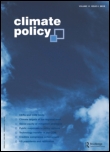Externe Publikationen

Exploring links between national climate strategies and non-state and subnational climate action in nationally determined contributions (NDCs)
Hsu, Angel / John Brandt / Oscar Widerberg / Sander Chan / Amy WeinfurterExterne Publikationen (2019)
in: Climate Policy 20(4), 443-457
DOI: https://doi.org/10.1080/14693062.2019.1624252
Information
Non-state and sub-national actors (e.g. companies, civil society, cities and regions, collectively referred to as ‘NSAs’) could bridge the ambition gap left by insufficiently ambitious nationally determined contributions (NDCs) under the Paris Agreement. Increasing effective non-state and sub-national contributions could both support NDCs’ implementation and spur ambitious updates to these national climate action plans. The impact of NSAs depends partly on whether and how national climate strategies recognize them. Yet, systematic knowledge about the extent to which national governments envisage a role for non-state and sub-national climate action is scarce. How do governments refer to NSAs in their NDCs; and what capacities, functions, and in which sectors do they envisage non-state contributions? We apply structural topic modelling (STM), an efficient quantitative text analysis technique seldom used in global climate governance research, to 147 NDCs to explore whether and how national governments incorporate non-state and subnational contributions into their international climate commitments. Using this method, we identify key topics for non-state and subnational engagement in NDCs, including vulnerability and adaptation, monitoring, general and sector-specific collaboration, and policy support. We find that developing countries overwhelmingly reference NSAs more frequently than developed countries. We also find predominantly negative trade-offs in how countries link to NSAs, suggesting countries tend to mention NSAs’ contributions in specific roles rather than across multiple sectors. Our findings suggest there is scope for countries to broaden their linkage to NSAs in their updated NDCs to further catalyze engagement.
Key policy insights
Linkages to NSA initiatives (including cities, regions, businesses or civil society) in NDCs under the Paris Agreement are mostly made by developing countries.
Developing countries describe NSAs primarily in the context of vulnerability and adaptation policy implementation, while developed countries mainly describe these actors’ role as collaborators across a range of functions.
Closer coordination between NSAs and national governments, to fully leverage NSA contributions to NDCs, can be achieved by explicitly outlining NSAs’ contributions in future updates of NDCs.
Kontakt
Cornelia Hornschild
Koordinatorin Publikationen
E-Mail Cornelia.Hornschild@idos-research.de
Telefon +49 (0)228 94927-135
Fax +49 (0)228 94927-130
Alexandra Fante
Bibliothekarin/Open Access-Koordinatorin
E-Mail Alexandra.Fante@idos-research.de
Telefon +49 (0)228 94927-321
Fax +49 (0)228 94927-130



